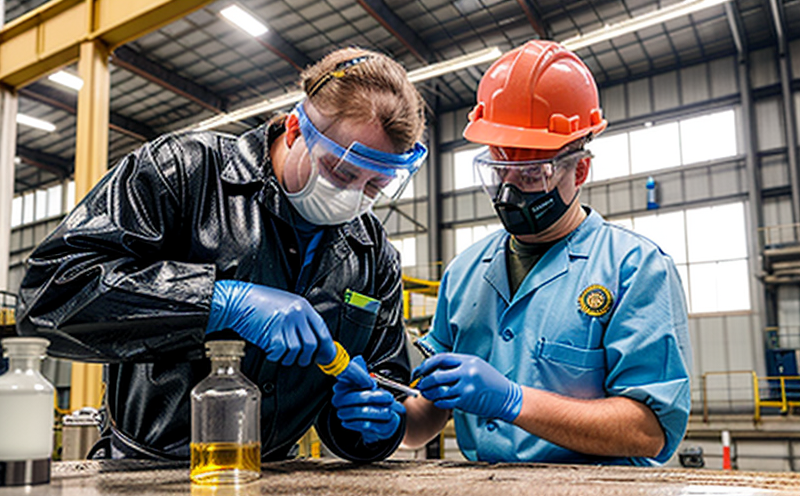Testing chemical resistance of materials in various industrial environments
The Crucial Test of Time Understanding the Importance of Testing Chemical Resistance in Industrial Environments
In todays fast-paced industrial landscape, ensuring the reliability and durability of materials is paramount to preventing costly equipment failures, product recalls, and even safety hazards. One critical aspect that often goes unnoticed until its too late is the chemical resistance of materials used in various industrial environments. This is where Testing chemical resistance of materials comes into play a vital laboratory service provided by Eurolab that helps businesses like yours safeguard their products and operations.
The Industrial Environment A Hostile Territory for Materials
Industrial environments are notorious for their harsh conditions, which can be unforgiving to materials not designed or tested for such conditions. Chemicals, whether from manufacturing processes, storage facilities, or even the environment itself, can wreak havoc on equipment, products, and personnel. Corrosion, wear, and tear, and degradation of materials can lead to catastrophic failures, costly repairs, and even safety risks.
The Importance of Testing Chemical Resistance
Testing chemical resistance is no longer a nice-to-have; its an absolute necessity for businesses seeking to maintain their reputation, customer satisfaction, and bottom line. Here are the key advantages of using this laboratory service
Advantages of Testing Chemical Resistance Key Benefits
Prevent Equipment Failures Identify potential weaknesses in materials before they lead to costly equipment failures, reducing downtime and maintenance costs.
Enhance Product Quality Ensure your products meet industry standards by testing their chemical resistance against various substances.
Ensure Compliance Stay compliant with regulatory requirements, such as those set by ASTM, ISO, or other relevant organizations.
Reduce Costs Minimize potential losses from product recalls, replacements, and repairs caused by inadequate material selection.
Protect Personnel Safety Safeguard workers from the risks associated with chemical exposure and equipment failure.
The Eurolab Difference Expertise and State-of-the-Art Facilities
At Eurolab, we offer a comprehensive testing service that utilizes state-of-the-art facilities and expert personnel to provide accurate results. Our team of dedicated scientists will work closely with your organization to
Conduct thorough assessments of your materials in various industrial environments
Develop customized testing protocols tailored to your specific needs
Provide detailed reports and recommendations for material selection and application
QA Clarifying the Process and Benefits
Q What types of materials can be tested?
A We test a wide range of materials, including metals, plastics, composites, ceramics, and more.
Q How long does the testing process take?
A The duration varies depending on the complexity of the test, but our team will provide a comprehensive timeline for each project.
Q What kind of results can I expect from the testing service?
A Youll receive detailed reports outlining your materials performance under various chemical exposures. These findings will help you make informed decisions about product development and selection.
Take Control of Your Material Selection with Eurolab
Dont let inadequate material testing put your business at risk. Choose Eurolab for expert Testing chemical resistance in various industrial environments services. Contact us today to learn more about our comprehensive testing solutions and how they can safeguard your products, operations, and reputation.
-
Evaluating how different materials react when exposed to specific chemicals
-
Assessing the long-term compatibility of materials with various chemical substances
-
Determining how chemicals affect the physical properties of metals, plastics, and ceramics
-
Simulating material failure under different chemical exposures in manufacturing processes
-
Evaluating the impact of chemical exposure on material integrity in harsh environments
-
Ensuring that chemical formulations do not compromise the strength or performance of materials
-
Assessing compatibility with materials used in packaging, coatings, and containers
-
Testing the impact of aggressive chemicals on seals, gaskets, and other critical components
-
Evaluating the interaction between different chemicals and materials used in consumer products
-
Testing the effect of chemical exposure on elastomers and rubber materials
-
Assessing the compatibility of composite materials with aggressive chemicals used in industrial applications
-
Ensuring that chemicals do not cause degradation or corrosion of equipment, pipelines, or tanks
-
Simulating different chemical exposure scenarios to determine material suitability and durability
-
Testing materials for compatibility with chemicals at different temperatures, pressures, and conditions
-
Evaluating chemical interactions between two or more substances and their effect on material properties
-
Testing the compatibility of materials used in the automotive, aerospace, and medical industries with chemicals
-
Determining the best material choices for applications involving aggressive chemical environments
-
Testing the effects of chemical exposure on surface finishes, including coatings and plating
-
Ensuring the safe use of chemicals in consumer goods by testing material compatibility for health and safety
-
Evaluating the stability of materials over time when exposed to chemicals in manufacturing and storage
-
Determining the performance of coatings and films when exposed to various chemicals used in industrial processes




